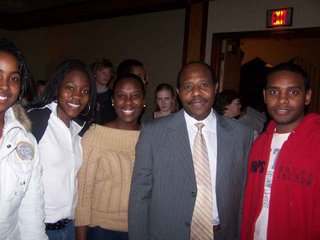
Ordinary People
We've got a little cat we're very fond of. One blustery November evening I hadn't secured the cellar door and I found her, still a kitten mewing in the furnace room the next morning. Farm fields surround our house and stray cats occasionally try to make a home here; mostly I've taken them to the animal shelter. This time I did not because our sage cat, Sam, was getting quite decrepit. We nammed her Alex on the suggestion of my littlest niece whose best friend is Alexa but everyone calls Alex.
Tonight on the PBS Newshour Paul Rusesabagina was interviewed. The picture is Rusesabagina flanked by members of Pitt's African Student Organization. It and was taken by Peter Otika Okema when Mr. Rusensabagina spoke at Soldiers and Sailors this past autumn. He was the real-life hotel manager portrayed by Don Cheadle in the movie Hotel Rwanda. I didn't got to hear him speak when he was in town and I'm sorry now because I enjoyed him in this interview so much.
Paul Rusesabagina has written a new book, An Ordinary Man. Faced with catastrophe he stayed the same hotel manager throughout.
I've worked briefly as a waiter and know some good waiters. Recently there was an essay in the paper by Mike Rose who has written a book called: The Mind At Work: Valuing the Intelligence of The American Worker. In the essay Rose talked about sitting in the back booth watching his mother work as a waiter in a dinner when he was a kid, and how he discovered how much intelligence the work requires.
Rusesabangina's actions saved thousands from slaughter. He talked about sitting in the evening with soldiers with flecks of blood on their uniforms, but the talk was ordinary. He was asked how he persuaded them not to kill the people at the hotel. And he answered "everyone has a soft spot."
Our cat Alex is awfully good at finding soft spots. I'm sure there are many who don't like cats, but the Friday blog tradition of cat blogging and all those cute pictures of kittens on the Internet make a good case for the premise of people's soft spot. I'm not claiming the cat is particularly intelligent, not really knowing what goes on in a cat's brain. But I do think for a person to find that soft spot take quite a lot of intelligence very much like Mike Rose suggests in his book. Managing a hotel is a complicated enterprise; and managing a luxury hotel that added talent for appealing to people's soft spot. Calling his book about the Rwandan genocide An Ordinary Man humanizes the tragedy rather than making himself the hero.
With a book to sell what Paul Rusesabagina wanted most to talk about was Darfur and ending the genocide there. His calm presentation, factual and pragmatic was extraordinarly convincing. He calls on us to be decent and ordinary.
Sifu Tweety at The Poor Man Institute for Freedom and Democracy and a Pony writes regarding Sy Hersh's recent The New Yorker article, Hersh was wrong! taking the position that the idea of dropping nuclear bombs on Iran merely serves to frame the debate: Don't nuke Iran! instead of No war on Iran! Billimon at The Wiskey Bar penned a piece Mutually Assured Dementia. He writes:
Maybe it's just me, but I've been at least a little bit surprised by the relatively muted reaction to the news that the Cheney Administration and its Pentagon underlings are racing to put the finishing touches on plans for attacking Iran – plans which may include the first wartime use of nuclear weapons since Nagasaki.Read the piece if you haven't already. What's striking is how ordinary we seem to take this talk of preemtive war nowadays. It's rather like the conversations Paul Rusesabagina was talking about with soldiers in the hotel bar in the midst of the slaughter.
I like Harper's but they're slow to put their content up on the Web. April's editon is good with an article by Curtis White, The Spirit of Disobedience: An invitation to resitance. White quotes Simone Weil:
Evil when we are in its power is not felt as evil but as a necessity, or even a duty.Evil, such as contemplating preemption using nuclear bombs seems ordinary. Such much so that Sifu Tweety, who is appalled by the idea thinks it blunts our perception of the folly in dropping bombs on Iran at all. There is also a feeling of resignation, which I sadly admit to succumbing, that there isn't much to do in stopping this bunch.
White's piece discusses Thoreau's Civil Disobedience. White responds to our reluctance to take to the streets and remarks that part of it is "we remember the little Lenins and their big ideas." So what are we to do? White replies to the question:
Thoreau's suggestion should still be ours: a return to the fundamentals of being human.White has been quite critical of interviews like the PBS one of Rusesabagina in his book The Middle Mind: Why Americans Don't Think for Themselves and elsewhere. But he might well appreciate that Rusesabagina when he speaks of being ordinary means something very much like the fundamentals of being a human being. That we have become inured to the sufferring of others under the false pretense of "self-interest." Curtis White has more to say about that here. Paul Rusesabagina is perceptive to see that our soft spot is the entryway to or ordinary humanity.
2 comments:
Great post.
You might find the book "Nickel and Dimed: On (Not) Getting By in America" by Barbara Ehrenreich">N ickel and D imed: On (Not) Getting By in America by Barbara Ehrenreich interesting.
Here is a link http://www.henryholt.com/holt/nickelanddimed.htm
It is a very interesting look at life working for poverty-level wages in America.
I have ever watched Hotel Rwanda and I have it. John your doing a wondeful work.
Post a Comment